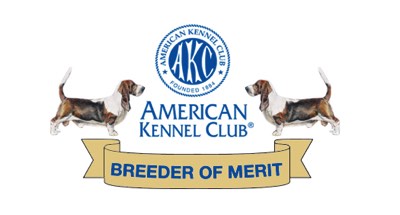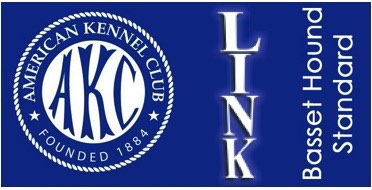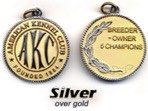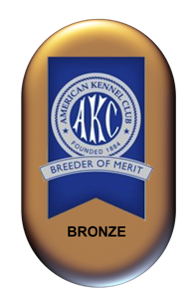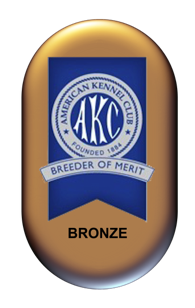

THE HEART OF THE AKC
At Woebgon Bassets we have been very careful on the quality of the bassets we’ve acquired and use for breeding. We continue to work on the development of the breed in respect and honor of those who worked so hard to provide us with such fine bloodlines and for the love we have for the breed. We have studied the breed's history extensively.
We agree that the primary objective of all good breeders must be to preserve and improve characteristics of the breed according to the AKC Standard for Basset Hounds, which we subscribed to from the beginning.
We love strong, sound basset hounds, with good structure and sweet, lovable temperament as the breed should be. For us temperament and health come first.
For all the above reasons, our breeding program is very selective and we don’t breed very often.
Those of us at Woebgon Bassets have great passion for this extraordinary breed. We could not live without our basset hounds; they are our children, our lives.
We are very proud to be responsible basset hound breeders. Through our breeding program we are doing our best to preserve this wonderful breed of dogs. We take the AKC Standard for Basset Hounds very seriously when we select sires and dams for our next litter. Temperament and health are our primary concerns in our selection process. Both of us have qualified to be designated by the American Kennel Club (AKC) to be Breeders of Merit for Basset Hounds.
Breeding is something we take very seriously. Both of us feel responsible for the lives we create. To us, breeding our dogs is a privilege and not a means of making money. In fact, we actually lose money on our litters.
Breeding dogs is a combination of art and science, common sense, educated decisions, screening for health issues, a certain amount of luck, a lot of hard work and many, many sleepless nights. No, it isn’t easy.
Before we even decide to breed one of our girls we scour her pedigree and look for a good match for a sire. We are very selective with who we breed our bitches to, with the idea of having puppies that are better than their parents, as it relates to the AKC Standard for Basset Hounds. We only breed our females to AKC Champion males or those that are well on their way to becoming Champions. More importantly, we breed for temperament and health. Before we breed, we screen both dogs for any health related issues.
We do not breed our girls before the age of 2 and have never had more than 2 litters from them.
Once the stud dog is selected, and the bitch is ready (normally 9 to 16 days after she comes in season), we try to breed them at least 3 times if at all possible. If frozen or fresh chilled are used we may only have one or two breedings. Often times the breedings are done based on progesterone tests conducted by our vet who specializes in canine reproduction. To date the majority of our breedings have been done using a form of artificial insemination. About 60-63 days after the breeding, we hope to have puppies. Unfortunately, even when we make our best efforts for a successful breeding, some breedings don’t take.
Approximately four weeks after breeding, we have our vet perform a ultrasound to determine if our bitch is pregnant. This is the moment of truth when we find out if our breeding efforts were successful. This initial ultrasound may even provide an idea of how many puppies we’re expecting.
Once we know that our girl is pregnant, we change her diet to one that is appropriate for pregnant bitches. Her hunger increases as she progresses through her pregnancy. We continue to use progesterone testing and ultrasound technology as necessary to monitor the condition of the mother and puppies. We have discovered that this step is very important and one many breeders omit. Yes, it costs money.
At eight weeks, the prospective mother is x-rayed to better determine the number of puppies. While the ultrasounds give an idea the x-rays give a better count of the number of puppies. They also indicate the development of the skeletal structure of the puppies. Again we may use progesterone testing and ultrasound technology to monitor the condition of the mother and puppies as prescribed by our reproduction specialist.
A date for delivering the litter is tentatively set. The mother-to-be is closely monitored. Progesterone testing continues to assist us in determining when the puppies are ready. At this point we may use ultrasound to check the heart rates of the puppies to make sure there aren’t any signs of stress. As we get closer to the time for the puppies to be due we find it very difficult to get a good night’s sleep. Bitches are notorious for starting labor in the middle of the night. From now to the end of the third week after puppies are born we don’t get much sleep.
When we’re sure that the puppies are ready through our observations of the female and the progesterone numbers are right we schedule a c-section to deliver the puppies. While c-sections do have risks we have had too many difficulties arise with our litters that would have prevented successful natural whelps that we feel safer doing them. Of course, this may change in the future if we’re certain we’ll have a successful natural whelp.
For at least two and a half to three weeks after the puppies are born we're with our puppies 24 hours a day 7 days a week. This is where the true sleepless nights come into play. Even if we’re the one scheduled to get some sleep we must be alert to any problems that require our assistance. Unlike many breeds, basset hound mothers and puppies have to be monitored closely during this time especially when they are together which is most of the time. This is in addition to the normal care and feeding of a bitch and her litter. Fortunately, due to the arrangements we’ve made here at home our bed is very close to the whelping box. If the one on duty needs extra help the one trying to get some sleep is very close by.
Over the next several weeks, the puppies are monitored closely. We even have a TV camera directed at the whelping box so that we can monitor the litter with a TV monitor. During this time the puppies are started on a series of puppy shots. We closely follow our vets advice for the schedule of shots.
The puppies begin eating mush made from a special puppy food when they are about three weeks. For the next couple of weeks the mush is increased and the time they spend getting milk from their mother is decreased. At four to five weeks, the puppies are weaned. The change is based on their weight and how well the puppies are eating the food.
While most of the concern is directed to the puppies, special attention to the mom continues until the puppies are fully weaned. She is pampered continuously and is on a special diet to promote milk production and the necessary nutrients for both her and the puppies.
We weigh our puppies every day for at least the first five to six weeks, then at least weekly, to insure that they are all gaining weight. When we weigh them each puppy is closely examined as well.
We do not allow visitors other than family and close friends with the puppies until they are at least seven weeks old. That gives them time for their immune systems to kick into gear and they have had their first series of immunizations. Even then visitors are required to either remove their shoes or dip them in bleach until after the puppies have received all their shots. At first the visitors are family members, other breeders or close friends. We encourage additional visitors for the puppies, including prospective buyers, starting at about eight weeks to help socialize the puppies. Other breeders come to see the puppies too. We gladly accept any input they can provide of the litter. What they tell us is very important. The puppies need to get used to other people at a young age so visitors are always welcome.
Our puppies begin using the doggie door at about 7 - 8 weeks of age. Most are leash trained by 10 weeks. We continue to evaluate our puppies to determine which may be destined for the show ring and possibly for future breeding. The difference between a show dog and pet is very slight.
When the puppies are approximately 8 to 10 weeks old we usually have a “Puppy Party” for basset hound breeders, close friends and family members. This event provides a great socialization experience for the puppies. We also receive additional “expert” feedback from the other basset hound breeders on the quality of the litter and each puppy. It’s an event we look forward to because we’ve been so isolated from everyone while we were taking care of the litter. Those who attend enjoy the parties too. Afterwards the puppies are exhausted.
We are very selective as it relates to choosing homes for our puppies. We work very hard to match the right puppy with the right home. Many factors are taken into consideration as we work with our prospective puppy buyers. Are their small children, elderly people, and other dogs in the household? Does the home have necessary fencing? Is there a pool? If prospective buyers have had a basset previously or currently have one is also something we consider. The work schedules of prospective buyers is always a factor in our decisions. We discuss these and other issues with people before they are placed on our list of prospective puppy homes.
Many puppy buyers request a certain color and sex. We cannot guarantee what color or sex will be available until we complete the puppy evaluation process. Puppy buyers need to understand that responsible breeders may not have the color or sex they want nor are their puppies available on a regular basis. Being flexible and patient is extremely important.
We require every potential puppy buyer and their entire family to visit our home so they get to know us as breeders and for us to get to know our prospective puppy buyers. Meeting potential puppy buyers and their whole families is a very important to us. The visit is also important because people see all our dogs, especially the mother of the puppies, and our home. These visits usually occur after we have puppies.
We do not sell puppies over the Internet or somewhere away from our home. All buyers must see the puppies before they are offered one for sale. We insist on meeting all family members.
We require a spay and neuter contract and reserve the right to allow only a Limited AKC registration on any pet (non-show) puppies. The AKC registration papers are ONLY given to our puppy buyers after we receive proof from a licensed veterinarian that the puppy has been spayed/neutered or we mutually agree on limited AKC registration. As part of our contract we require that our puppies have a fenced yard for exercise and a place to sleep in the house at night.
For puppies sold to a show home we require that at least one of us to be a registered co-owner of the puppy unless special arrangements can be made. We will help show the dog if necessary and are always available for help and advice. Potential show puppies are seldom available before they are about six months old. Show puppies are sold only under a special contract that requires that they are shown.
Non show (pet)) puppies will not be available until they are 10 to 12 weeks of age, at the very earliest. Often our evaluation of puppies delays this period up to six months. That all depends on the puppies and our desires as the breeders.
We require any of our dogs to be returned to us if he or she is not wanted or they can’t be properly cared for, regardless of age or reason. Dogs we sell CAN NOT be resold or given away without our signed, written permission. This is a binding part of our Bill of Sale.
Each puppy buyer is provided a pedigree showing the puppy’s ancestors and a photo album from the day they were born to very close to the time they go to their new home. Copies of any videos of the litter are also included. In addition the new owners receive a copy of the signed contract and bill of sale. We also supply some of the food that the puppy has been eating and a toy and/or blanket with our scent and the scent of the litter mates. We feel that all this is important because the puppies we sell are a special part of the families they go to and we want the transition to be as smooth as possible for the puppy.
We want the very best homes for our puppies and we want our puppy buyers to have a healthy, happy and well socialized dog that has been bred as closely to the AKC Standard for Basset Hounds as we possibly can. Why anyone would accept less we don't understand.
To see where our dogs live check out:
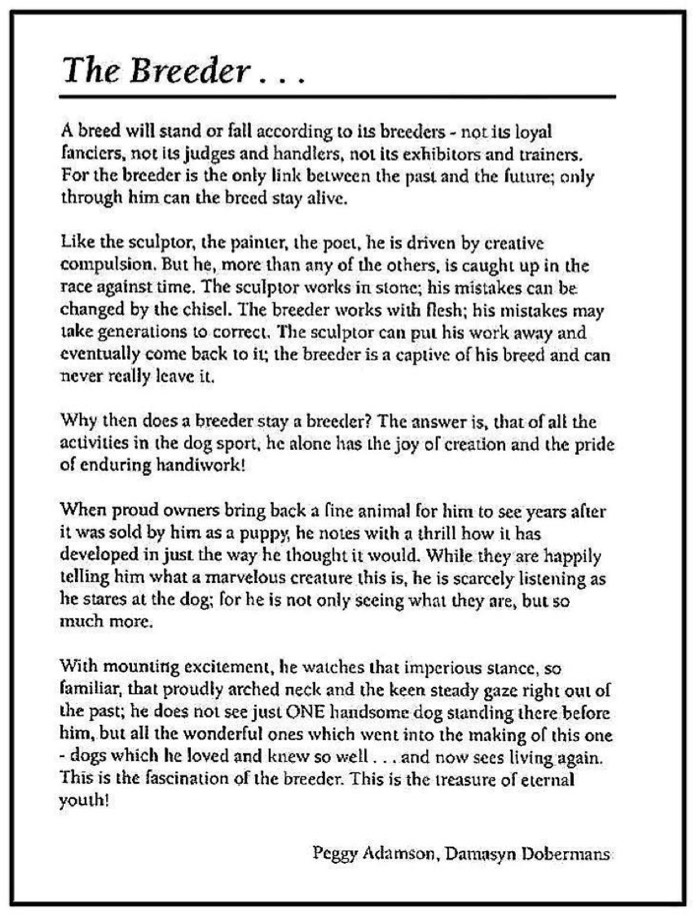
In recent years breeders have come under attack by those who would prevent the keeping of all domesticated animals. There are many places that have banned breeding and/or selling dogs bred by a breeder. Most of these laws only allow for dogs from shelters and rescue groups to be sold locally. To answer these critics we have an entry in our website blog. (LINK). You may find the following interesting as well.
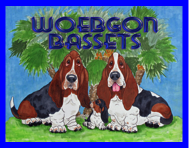
This website was created and is maintained by Don Bullock.
He can be reached at basithd@yahoo.com
All material on this website is copyright by Donald W. Bullock
All rights are reserved
Click on photo.
For more on this topic I suggest the following link:
Do Shelters Support Puppy Mills?
By Laura Turner
Part of what she says:
“First we have to ask where the puppy came from? In most cases, it came from a puppy mill. It is rare for owners to turn a purebred dog in to a shelter, especially when it is still a puppy. So purebred puppies or designer dogs invariably come from puppy mills. Do you wonder how that happens?”
“Responsible breeders producing purebred dogs as defined by the American Kennel Club, spend a fortune in testing the parent’s health, temperament, intelligence and conformation. As a result of all this testing, most responsible breeders have thousands of dollars invested in each breeding parent. The resulting pups are a product of long term goals of the breeder and are usually spoken for before they are even conceived.”
“I believe the need for shelters will never be eliminated but the public can greatly reduce those needs by purchasing purebreds from Responsible Breeders and by doing so, helping to eliminate the market for irresponsibly produced dogs and the resulting overflow of their pups going into shelters.”
“In other words, any family seeking a purebred pet would be well advised to ignore the animal rights rhetoric, the implied shame of buying what they want, and insure their satisfaction by contacting a reputable breeder. The “feel good” reward is that they have not supported a shelter that supports the production of poor quality purebreds and the throw-away concept.”
NOTE: AKC has recently started concentrating on using the term "responsible" for breeders who "do it right" so that term has been substituted for "reputable" in the quote above.
Responsible defined: having an obligation to do something, or having control over or care for someone, as part of one's job or role; capable of being trusted; morally accountable for one's behavior.
LINK: Responsible Breeders
IMPORTANT NOTE: I have left the following description of our breeding practice because it gives a good idea as to what those who are looking for puppies should expect in a breeder. Breeding is not easy and certainly, if done right, is NOT a quick way to make money. There is a lot to doing it right and producing quality puppies. We, however, have retired from breeding.

